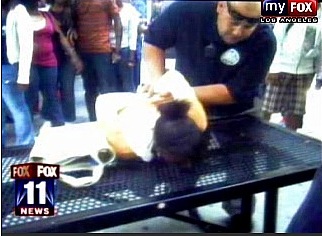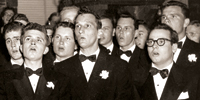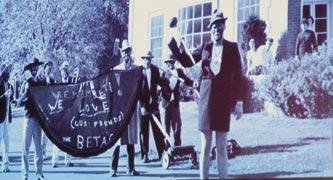One of the worst things about so-called public education,
i.e. government-controlled schooling, is that students are forced into an institution that they consistently find unpleasant and boring, whether or not the individual student thinks that it’s worth the trouble. That fact, combined with the fact that the victims are all young and many of them are poor or black or otherwise marked as at-risk youth
in need of special surveillance and control, naturally and systematically corrupts the way that the school relates to its students. It leads administrators and political decision-makers to focus on restraining the unruly behavior of the coerced students, by making authority, control, security,
and discipline
top priorities. In practice this means monitoring, intimidation, and coercion. These facts in turn result in attitudes and institutional practices throughout State schools that are often hard to distinguish from those prevailing in a prison camp.
Here are three stories that have come out, just over the course of the past week, about the practices of administrators and uniformed thugs in American public schools. In particular, they are about three separate cases in which one or the other set out to maintain control over their school by physically brutalizing or sexually humiliating young women.
The first case, from Arizona, happened four years ago. It’s in the news today because the famously liberal Ninth U.S. Circuit Court of appeals recently ruled that Safford Middle School officials were within the bounds of their legitimate authority when they forced a strip-search on a 13 year old girl — because a couple of student snitches claimed that she had some unauthorized ibuprofen on her, and the Authorities had to know for sure:
Safford Middle School officials did not violate the civil rights of a 13-year-old Safford girl
when they forced her to disrobe and expose her breasts and pubic area four years ago while
looking for a drug, according to the Ninth U.S. Circuit Court of Appeals ruling.
The justices voted 2-1 in favor of the Safford School District on Sept. 21. The decision
upheld a federal district court’s summary judgement that Safford Middle School Vice Principal
Kerry Wilson, school nurse Peggy Schwallier and administrative assistant Helen Romero did
not violate the girl’s Fourth Amendment rights on Oct. 8, 2003, when they subjected her
to a strip search in an effort to find Ibuprofen, an anti-inflammatory drug sold over the
counter and in prescription strengths.
…
The girl’s mother filed a federal law suit against the district and Middle School officials
because they forced her daughter to strip down to her underwear then move her bra and
panties in such a way that her breasts and pubic area were exposed. The mother also
asserts that she was not notified of the impending search.
In the opinion written by Judge Richard Clifton, Based on the information available to
them, defendants (Safford School District, Wilson, Schwallier and Romero) had
reasonable grounds
for suspecting that the search of (the girl’s) person would turn
up evidence that (the girl) had violated or was violating either the law or the rules of the
school.
Clifton wrote that Wilson and the others had reasonable grounds for believing the girl had
Ibuprofen based on conversations with two other students.
The other students said the girl possessed Ibuprofen and had distributed the drug to others,
according to the court report.
— Diane Saunders, Eastern Arizona Courier (2007-09-26): Court rules school officials acted properly in strip search
The second case is from New York, where — in order to enforce a blanket no-bags policy putatively adopted for the students own health and safety — a member of the school goon squad decided that it was O.K. for him, an adult male ex-cop, to pull 14 year old girls carrying purses out of class and interrogate them about their menstrual cycles:
Grahamsville — Several television news crews from New York City are camped outside the
Tri-Valley Central School following the story in today’s Times Herald-Record about what
question a school security guard asked a 14-year-old female student.
The girl was called out of class by a security guard during a school sweep last week to make
sure no kids had backpacks or other banned bags.
Samantha Martin had a small purse with her that day.
That’s why the security guard, ex-Monticello cop Mike Bunce, asked her The Question.
She says he told her she couldn’t have a purse unless she had her period. Then he asked,
Do you have your period?
Samantha was mortified.
She says she thought, Oh, my God. Get away from me.
But instead of answering,
she just walked back into class.
At home, she cried, and told her mother what happened.
It appears that at least a few other girls were also asked the same question.
On Sept. 21, Martin and other girls were called to the office of Principal Robert Worden. Lisa
Raymond, the assistant superintendent for business, was also there, Martin said.
They just asked me what he (Bunce) said. I told them, and they said thanks for
coming,
she said.
The small Sullivan County school has been in an uproar for the last week. Girls have worn
tampons on their clothes in protest, and purses made out of tampon boxes. Some boys wore
maxi-pads stuck to their shirts in support.
After hearing that someone might have been suspended for the protest, freshman Hannah
Lindquist, 14, went to talk to Worden. She wore her protest necklace, an OB tampon box on
a piece of yarn. She said Worden confiscated it, talked to her about the code of conduct
and the backpack rule — and told her she was now part of the problem.
Tri-Valley Superintendent Nancy George, who has refused to meet with any reporters today,
yestedar said that when Worden, Bunce and another staffer did the bag check, they were
telling students to put the bags in their lockers. The administration is investigating whether
they said anything more to some girls.
I have had some parents talk to me personally, and they gave me the names of some
students
who were asked, she said. We’re certainly not going to make light of this.
It’s a very sensitive issue, but it needs to be handled.
Parents with more information
should call her directly, she added.
Raymond and Worden failed to return calls yesterday for comment. Bunce was not working
yesterday, and his home phone number is unlisted.
Bunce was forced to retire from the Monticello Police Department in 2002 after he and the
former chief were caught running their process-serving business on village time.
School board President Lori Mickelson declined comment.
The school banned backpacks in the halls this year for two reasons, George said: Student
health, because heavy bags could hurt the kids’ backs or people could trip on them; and for
security concerns, felt nationwide, about concealed weapons.
— Heather Yakin, Times Herald-Record (2007-09-28): The Question’ causes furor at local high school
Clearly the Authorities concerns about small purses and their contribution teenagers’ back problems outweigh minor considerations like the dignity and sexual privacy of 14 year old girls.
The third case comes from Palmdale, California, near Los Angeles, where a member of the school goon squad slammed Pleajhai Mervin, a young black woman at Knight High School, down on a table, twisted her arm behind her back, and broke her wrist — after she refused to follow his bellowed orders to make a fourth try at cleaning up the last bits of a slice of cake that she had accidentally spilled on the lunchroom floor. According to Mervin, the uniformed thug yelled hold still nappy head
at her during the course of the attack. The fifteen-year-old young woman was then ticketed for littering, expelled from school, and arrested for battery
against the beefy uniformed security thug who was breaking her wrist while other security goons hovered around. Two other black students — a 14 year old boy and his 16 year old sister — were tackled, held down, shoved around, handcuffed, and arrested for daring to film what was going on using their cell phone cameras.
School security guards in Palmdale, CA have been caught on camera assaulting a
16-year-old girl and breaking her arm after she spilled some cake during lunch and left some
crumbs on the floor after cleaning it up.
… The girl, Pleajhai Mervin, told Fox News LA that she was bumped while queuing for lunch
and dropped the cake. After being ordered to clean it up and then re-clean the spot three
times, she attempted to leave the area out of embarrassment but was jumped on by
security who forced her onto a table, breaking her wrist in the process.
—Steve Watson, InfoWars (2007-09-28): School Guards Break Child’s Arm And Arrest Her For Dropping Cake
Mervin says a security guard slammed her against a table at a lunchroom at the high school
and twisted her arms behind her back so violently, he broke her wrist. Her wrist is in a cast.
He put my arm behind my back and he started raising it until it hurt, so I told him,
Stop, it hurts.
He had slammed me on the table and told me to hold still. He called
me a nappy-head,
and that’s when I just started crying,
said Mervin.
Mervin claims she was roughed up simply because she failed to pick up every crumb of a
birthday cake she accidentally dropped on the floor of the lunchroom during a lunch-hour
birthday celebration for a friend. She says she thought she cleaned up the mess, but the
security guard thought otherwise.
He said, You have to come pick the rest of this cake up.
So I said, I picked
it up.
He gets on his walkie-talkie, he got a call, so I just started walking to class, and
that’s when he grabbed me,
said Mervin.
Mervin says when the security guard realized he was being videotaped, he tackled the
student shooting the video. She says another student captured photographs of that
incident. She says the whole incident was unnecessary.
—Leo Stallworth, KABC Los Angeles (2007-09-26): High School Security Guards Accused of Excessive Force
One security guard twisted the arm of 16-year-old Pleajhai Mervin behind her back and
slammed her against a lunch table, fracturing her wrist, parents said.
I want justice,
said Mervin’s mother, Latrisha Majors, who also was arrested. I
want justice for my daughter. I want the guards to be held accountable for their
actions.
Majors and her daughter were arrested in the Sept. 18 lunchtime incident, along with Joshua
Lockett, 14, who videotaped the fight, and his sister, Kenngela Lockett, 16, who also
suffered a fractured wrist.
Both Mervin and Kenngela Lockett attended the protest with their arms in slings.
Joshua Lockett, who was on probation for robbery, remained in juvenile custody on suspicion
of violating his probation, sheriff’s deputies said.
We come to get an education, not to be hurt by security guards,
said Kenngela,
who said she tried to pull guards off her brother and was hurt while being handcuffed.
One guard, whose name has not been publicly released, has been placed on leave with pay
pending an investigation by the Antelope Valley Union High School District. Attempts to
reach the guard were not successful.
Los Angeles County sheriff’s deputies said the guard told them he felt threatened by
Mervin.
There was resistance by her,
Sgt. Darrel Brown said. He went to control
her.
— Karen Maeshiro, LA Daily News (2007-09-29): Rally protests security guard acts.

Mainstream media sources such as the Los Angeles Times, KABC in Los Angeles, KSN (a local NBC affiliate), and the LA Daily News have repeatedly described what happened as a tussle … between a security guard and three students,
as a scuffle with security guards,
a melee with security guards,
mayhem,
etc. This apparently is what passes for accurate description of a professional uniformed security goon battering two high school girls and a fourteen-year-old boy, while he’s backed up by another security goon hovering around the area and clearly outweighs all of his victims. You can watch part of Joshua Lockett’s video of the scuffle
at MyFox Los Angeles (2007-09-26) and MyFox Los Angeles (2007-09-28).
Oh No A WoC PhD (2007-09-30) has a YouTube montage of more photos and videos from this so-called melee
, and also the contact information for school and city officials.
(Stories thanks to feministing 2007-10-01, Women of Color Blog 2007-09-30, Oh No a WoC PhD 2007-09-30, The Superfluous Man 2007-09-28, Radley Balko 2007-09-28, feministing 2007-09-28, and Majikthise 2007-09-28.)
State schooling, institutional racism, blanket zero-tolerance
policies, and increasing police and security
presence in schools have ensured that many if not most American schools are no longer primarily places of learning. They are guarded institutions whose primary focus is on command and control.
Further reading:




